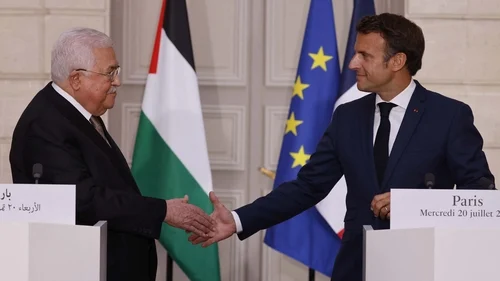France has announced plans to recognise a Palestinian state at the upcoming United Nations General Assembly, aiming to support peace efforts in the Middle East. The decision has drawn strong criticism from the United States and Israel, while Saudi Arabia and Spain have welcomed it, reflecting deep divisions within the international community.
President Macron announced that France will recognise the State of Palestine at the upcoming General Assembly. He said the aim is to support peace efforts in the Middle East. However, both Israel and the United States have strongly opposed the move.
Macron shared a letter sent to Palestinian Authority President Mahmoud Abbas. In it, he confirmed France’s intention and urged other countries to follow.
“True to France’s long-standing commitment to peace in the Middle East, I have decided that France will recognise the State of Palestine,” Macron stated. He plans to make the formal declaration at the UN General Assembly next month.
France has the largest Jewish and Muslim populations in Europe. This recognition makes it the first major Western power to take such a step. So far, support has mostly come from smaller nations critical of Israel.
Israel and the United States condemn the move
Israeli Prime Minister Benjamin Netanyahu reacted strongly. He called the move a “reward for terror” and warned it could lead to the creation of “another Iranian proxy.”
He posted on X, “A Palestinian state under these conditions would be a base to destroy Israel, not to live alongside it. The Palestinians do not seek a state next to Israel; they want one instead of Israel.”
Israeli Defence Minister Israel Katz also criticised the decision. He said it was “a disgrace and a surrender to terrorism.” He added that Israel would not allow the creation of a Palestinian entity that threatens its security.
US Secretary of State Marco Rubio echoed Israel’s position. He said the United States “strongly rejects” Macron’s initiative.
Rubio wrote on X, “This reckless decision helps Hamas propaganda and delays peace. It’s a slap in the face to the victims of 7 October.”
France defended its position. Foreign Minister Jean-Noel Barrot said on X that Hamas has always rejected a two-state solution. “By recognising Palestine, France stands against Hamas and its agenda,” he wrote.
International reactions remain divided
Canada also responded to the situation. Prime Minister Mark Carney criticised Israel’s handling of the crisis in Gaza. He said Israel has failed to prevent a worsening humanitarian disaster. Carney repeated his country’s support for a two-state solution.
He also accused Israel of blocking Canadian-funded aid to civilians in Gaza. “Canada calls on all parties to negotiate a ceasefire in good faith,” he said. “We urge Hamas to release all hostages and call on Israel to respect the borders of the West Bank and Gaza.”
Spanish Prime Minister Pedro Sanchez welcomed Macron’s plan. Spain already recognises Palestinian statehood.
“We must defend what Netanyahu is trying to destroy. The two-state solution remains the only way forward,” Sanchez said. He has been a vocal critic of Israel’s military operations in Gaza.
Saudi Arabia also praised Macron’s move. The Saudi Foreign Ministry described it as “historic.” It urged other nations to take similar steps and support Palestinian rights and peace efforts.
Strains among Western allies
The US has previously warned against any unilateral recognition of a Palestinian state. It suggested such moves could damage US foreign policy interests.
In June, US Ambassador to Israel Mike Huckabee said the two-state solution was no longer a key American goal. President Donald Trump also doubted the idea. In February, he proposed a US takeover of Gaza. Many saw this as a form of “ethnic cleansing.” The plan was condemned by human rights groups, Arab nations, the UN, and Palestinians.
Macron had been considering the recognition for months. French officials saw it as a way to revive discussions around the two-state solution. This was despite international pressure to avoid such a move.
France and Saudi Arabia had planned a UN conference in June. The goal was to set out a roadmap for Palestinian statehood while ensuring Israel’s security. However, the event was delayed due to the outbreak of a 12-day conflict between Israel and Iran. The fighting made regional travel difficult and limited participation.
The conference was rescheduled as a ministerial meeting on 28 and 29 July. A follow-up event with world leaders is now expected to take place on the sidelines of the UN General Assembly.
France aims to build support ahead of UN talks
By announcing the plan early, France hopes to shape discussions ahead of the UN meeting. French diplomats want to work with countries that are open to recognising Palestine or are still undecided.
Macron has faced pushback from key allies, including the UK and Canada. Around 40 foreign ministers are expected in New York for the talks.
Israel has lobbied against the recognition for months. Officials have warned of consequences, including reduced intelligence sharing and setbacks to France’s efforts in the region. Some Israeli officials even hinted at possible annexation of parts of the West Bank.
Israel continues its military operations in Gaza. The war began after Hamas attacked Israel in October 2023. Israel argues that recognising a Palestinian state now would reward Hamas.
In response, Palestinian Authority Vice President Hussein Al Sheikh thanked France. He said the decision showed France’s support for international law and the Palestinian people’s right to self-determination and statehood.
